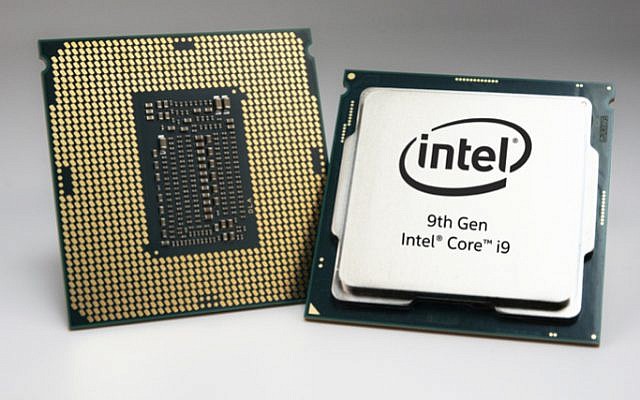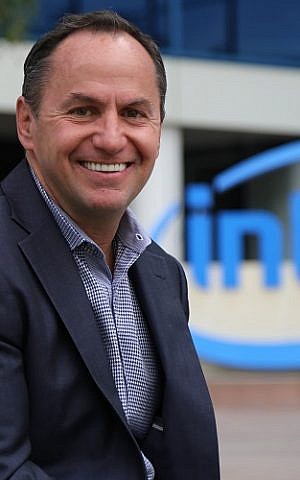Israel will likely continue to be key to Intel Corp.’s global activities even as the company gets a new CEO, a person familiar with the US tech giant’s operations said.
Intel on Wednesday said it had appointed Pat Gelsinger as its new chief executive officer, replacing Bob Swan at the post on February 15.
Gelsinger is an industry veteran with more than 40 years of technology experience, including 30 years at Intel, where he began his career, the US firm said in a statement.
For the past eight and a half years Gelsinger has led VMware, building it into a global leader in cloud infrastructure, enterprise mobility and cybersecurity and almost tripling the company’s annual revenues. He was ranked number 1 CEO in the world in 2019 by Glassdoor and named Fortune #2 Businessperson of the Year in 2018.

Intel Corp.’s 9th Gen Core, sired by its Haifa team, was launched by the US tech giant on April 23, 2019 (Courtesy)
Intel hopes to “draw on Pat’s technology and engineering expertise during this critical period of transformation at Intel,” said Omar Ishrak, independent chairman of the Intel board, in the statement.
Gelsinger has always had good ties with Israel and hopefully that will continue, the person familiar with Intel’s operations in Israel and globally said. The Israeli team does good work for the company, and thus is likely to continue to be a key development center for the firm, the person said.
Israel is home to the largest Intel development center in the world and the Israeli team’s contribution to the company’s global technology development is seen as significant. The 7th and 8th generation Intel processors were developed mainly in Israel. The firm’s factory in Kiryat Gat is considered one of the most advanced and highest quality among Intel factories around the world.

Intel Corp,’s Haifa team has developed the new 10th Gen Intel Core processors that bring AI to the PC for the first time (Courtesy)
Intel is Israel’s largest private sector tech employer, with 13,700 workers in Israel as of July — 7,300 in development and 4,900 in manufacturing. There are an additional 1,350 people employed at Mobileye, the self-driving technologies Jerusalem-based firm Intel bought for $15.3 billion in 2017.
In 2019, Intel said that it was expanding its operations in Israel by investing nearly $11 billion in a new plant at the Kiryat Gat manufacturing site. Also in 2019, Intel acquired Habana Labs, and in 2020 it bought smart-transit startup Moovit for $900 million.
Gelsinger spent 30 years at Intel, becoming the company’s first chief technology officer, and was behind the creation of key industry technologies such as USB and Wi-Fi. He was the architect of the original 80486 processor, led 14 microprocessor programs, and played key roles in the Core and Xeon families.
While employed at the firm, Gelsinger visited Israel a number of times and met with the local teams.
Outgoing CEO Swan was appointed in January 2019 after he served as interim CEO for seven months. Unlike Gelsinger, he did not come from a technical background.

Intel CEO Robert Swan, who was named as the technology firm’s chief executive on January 31, 2019. (Credit: Intel Corporation)
Under Swan’s leadership, Intel suffered from a series of setbacks, including market share losses to chip-making competitors such as AMD, Samsung and TMC and delays in the rollout of its latest generation chips. Meanwhile, tech firms have started producing their chips inhouse. This includes Apple, which broke a 15-year-old partnership with Intel for the supply of chips, as it started using its own chips in Mac computers.
In July, Swan said that Intel, following its competitors, would also start outsource the manufacturing of its chips when necessary, triggering a 16% plunge in the firm’s shares.
The Santa Clara, California-based Intel is the world’s largest semiconductor maker and has spent tens of billions of dollars over the years updating its manufacturing facilities worldwide. The firm’s management has touted its in-house manufacturing of chips — which power everything from laptops to data centers — as one of its key advantages compared to competitors, managing to attract top talent and leading to economies of scale.
Before joining VMware, Gelsinger was president and chief operating officer of EMC Information Infrastructure Products at EMC, overseeing engineering and operations for information storage, data computing, backup and recovery, RSA security and enterprise solutions.
Intel said that it will publish its fourth quarter results on January 21 and it expects to exceed its previous guidance for the quarter. The company added that it has made “strong progress” on its 7nm process technology and will provide an update on its earnings call later this month.
Related posts:
Views: 0
 RSS Feed
RSS Feed















 January 15th, 2021
January 15th, 2021  Awake Goy
Awake Goy  Posted in
Posted in  Tags:
Tags: 
















